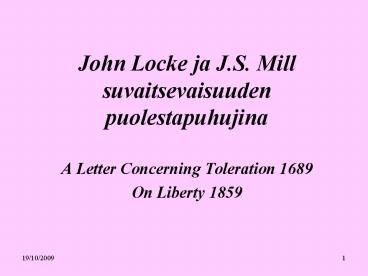John Locke ja J.S. Mill suvaitsevaisuuden puolestapuhujina - PowerPoint PPT Presentation
1 / 15
Title:
John Locke ja J.S. Mill suvaitsevaisuuden puolestapuhujina
Description:
2. The arg from scepticism: rulers cannot know which for of worship is the path ... 3. The argument from pragmatism and rulers' self-interest: there is no ... – PowerPoint PPT presentation
Number of Views:72
Avg rating:3.0/5.0
Title: John Locke ja J.S. Mill suvaitsevaisuuden puolestapuhujina
1
John Locke ja J.S. Mill suvaitsevaisuuden
puolestapuhujina
- A Letter Concerning Toleration 1689
- On Liberty 1859
2
Locken argumentti
- 1. The argument from the irrationality of
imposition by its very nature, faith cannot be
imposed, therefore the intolerant religious
oppressor acts irrationally. - 2. The arg from scepticism rulers cannot know
which for of worship is the path to salvation,
which counsels them to practice toleration with
respect to this aspect of faith (Locke did not
include atheists!)
3
- 3. The argument from pragmatism and rulers
self-interest there is no alternative to
toleration if stability is to be secured such
stability is in the interests of any ruler.
4
Lockelaisen suvaitsevaisuuden vastustus
heijastaa ylemmyyttä!
- Respect and recognition muiden edustamille
arvoille! - Mitä respect täsm ottaen tarkoittaa?
- Act in a certain way? A x gt Ay
- Ihmistä? Kulttuuria? Tapaa?
5
- A acts as if she respected y/B
- Jos riittää respect vaatijoille gt R
- Jos tarvitaan myös aito tunne
- Mahdotonta kuten Locke jo huomautti
- (voimme act as if, emme feel respect jos sitä
emme aidosti tunne!
6
Millin mukaan edustuksellinendemokratia on
luonut uuden uhan enemmistön diktatuurin,
tyrannian
7
Mills Liberty Principle
- LP 2 necessary and jointly sufficient
conditions for the interference of society (law
and public opinion) with the individual action
interfered with is - a) other-regarding
- b) harmful
- (leksikaalinen järjestys, an ensin täytyttävä)
8
Pitää kattaa 3 vapauden aluetta
- 1) liberty of conscience in the most
comprehensive sense liberty of thought and
feeling, absolute freedom of opinion and
sentiment on all subjects, practical or
speculative, scientific, moral or theological) - 2) liberty of tastes and pursuits, of framing
the plan of our own life to suit our character,
of doing as we like, subject to the consequences
that may follow without impediment from our
fellow creatures, so long as what we do does not
harm them, even though they should thinki our
conduct foolish, perverse or wrong
9
and
- 3. liberty of combination amond individuals
freedom to unite, for any purpose not involving
harm to others.
10
- It is proper to state that I forego any
advantage which could be derived to my argument
from the idea of abstract right, as a thing
independent of utility. I regard utility as the
ultimate appeal on all ethical questions but it
must be utility in the largest sense, grounded in
the permanent interests of man as progressive
being.
11
Sn viisi piirrettä (mm. McKinnon, Nicholson)
- Difference (S O eroaa suvaitsevan subjektin
näkemyksestä tms.) - Importance (S O ei triviaali)
- Opposition (S S dislikes/disapproves what she
tolerates) - Power
- Non-rejection (S S ei käytä valtaansa)
12
Suvaitsevaisuuden käsitteellinen määrittely
heikko, vahva ja laaja tulkinta
- Heikko tulkinta
- S S ei pidä tai paheksuu (dislikes and / or
disapproves) S O - Vahva tulkinta
- S on responssi evaluatiiviseen paheksuntaan
(differences evaluatively disapproved of by the
tolerator)
13
- 3. Laaja tulkinta
- kohteena yhtä lailla dislike /disapproval
- S S pitää omaa näkemystään aidosti oikeutettuna
- (miksi S O on syytä paheksua tms. JA miksi sitä
pitää kuitenkin suvaita)
14
Bernard Williams
- If we are asking people to be tolerant, we are
askingthem to lose something, their desire to
suppress or drive out the rival belief but they
will also keep something, their commitment to
their own beliefs, which is what gave them that
desire in the first place. There is a tension
here between ones own commitments and the
acceptance that other people may have other and
perhaps quite distasteful commitments. This is
the tension that is typical of toleration, and
the tension which makes it so difficult.
15
John Horton
- There are, so to speak, two directions from
which toleration can cease to be a virtue on the
one hand, some things should not be tolerated,
because they should not be permitted, on the
other, some things should not be objected to,
hence are not the approriate objects of
toleration.































